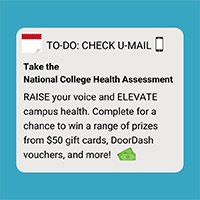Take the national college health assessment

ANOTHER SURVEY?
Survey fatigue... it's real. It's the reason why—every time I call my bank and the automated voice says, “Say ‘yes' to take a brief survey after your call”—I hold my breath and wait quietly for a live customer service agent to break the silence.
We are so inundated with requests for data; this is especially true for our students. Between schoolwork, internships, study time, and everything else, setting aside additional time to take a survey can feel impossible. It's understandable why students would prefer to skip out on every survey request. Nevertheless, data is exceptionally important, especially after the unprecedented and challenging year we've had.
Data is how we begin to understand the student experience; learn about health, wellness, and safety concerns; identify gaps in our services and resources; and develop programming to better serve you. While survey data looks like numbers and graphs, it represents something much more personal and compelling. Data tells us the story of who you are as a community, what you're experiencing, and what you might need from us.
Without responses directly from you, our office would be flying blind. We would be forced to make assumptions about your experience and what you need from us. And that just makes zero sense!
INTRODUCING THE NATIONAL COLLEGE HEALTH ASSESSMENT
To better understand University of Utah students, the Center for Campus Wellness participates in the National College Health Assessment (NCHA) every 2 years, which is conducted by the American College Health Assocation (ACHA). NCHA is a comprehensive tool that assess all parts of student health and well-being, including: mental health, substance use, sexual behaviors, nutrition, experiences of violence, and more.
Results from this assessment give us a holistic picture of Utah students' health and well-being. This allows us to seek out funding and plan future programs tailored to our students' needs.
In the past, we have used NCHA data to better understand top impacts on academic success—stress, sleep and anxiety—and address them accordingly. For example, after the NCHA 2017 results, we re-envisioned our Stress Care workshop and redesigned our Wellness Coaching program that addresses such issues.
Additionally, we have seen that many of our students struggle with feeling depressed, exhausted, and overwhelmed. We responded, in part, by making awareness of campus mental health resources a top priority for our ACES peer health educators' training. This includes introducing specific staff (mental health counselors, therapists, and behavioral intervention experts) to ACES. We know that students are more likely to access mental health services if they associate the resource center with a familiar face and name. Plus, raising awareness is key to destigmatizing asking for support.
We have also used information from NCHA about sexual behaviors to decrease barriers to access safer sex supplies (condoms, oral dams, lubricant). Data from this assessment and others, shows us where we have room for improvement in terms of what we offer to students. One example is the Pleasure Pack Delivery Service (PPDS), a student-founded project that was forged from campus assessments like NCHA (note: PPDS is on hold while we operate remotely).
So, we take your data seriously! The NCHA is an important assessment for our office and the campus as whole, because it ensures we customize our programs for our students.
YOUR VOICE MATTERS. USE IT TO ELEVATE CAMPUS HEALTH.
Nearly 7,000 undergraduate and graduate students will be chosen at random to complete this survey. Consider it an honor! Much like voting, taking the NCHA is a chance to add your voice to the conversation around student health and wellness. And when you raise your voice about these issues, you elevate the health of our campus.
Please look out for an invitation to complete the NCHA in your UMail inbox starting Tuesday, February 16. Students who successfully complete the survey will be entered to win a range of prizes including $50 giftcards, DoorDash vouchers, and more.
If you have any questions, please reach out to our Director, Brittany Badger Gleed at bbadger@sa.utah.edu.
Categories
Featured Posts
Blog Archive
- August 2023 (1)
- November 2023 (1)
- October 2023 (1)
- September 2023 (1)
- April 2024 (2)
- December 2024 (1)
- February 2024 (1)
- January 2024 (1)
- July 2024 (1)
- June 2024 (1)
- March 2024 (3)
- May 2024 (2)
- November 2024 (2)
- October 2024 (2)
- September 2024 (1)
- 2019 archive (2)
- 2020 archive (25)
- 2021 archive (28)
- 2022 archive (11)
- February 2025 (3)
- March 2025 (3)
- April 2025 (1)
- May 2025 (1)
- June 2025 (1)
- July 2025 (1)
- August 2025 (1)
- September 2025 (2)
- October 2025 (3)
- November 2025 (2)
- December 2025 (2)
- January 2026 (3)
- February 2026 (1)
